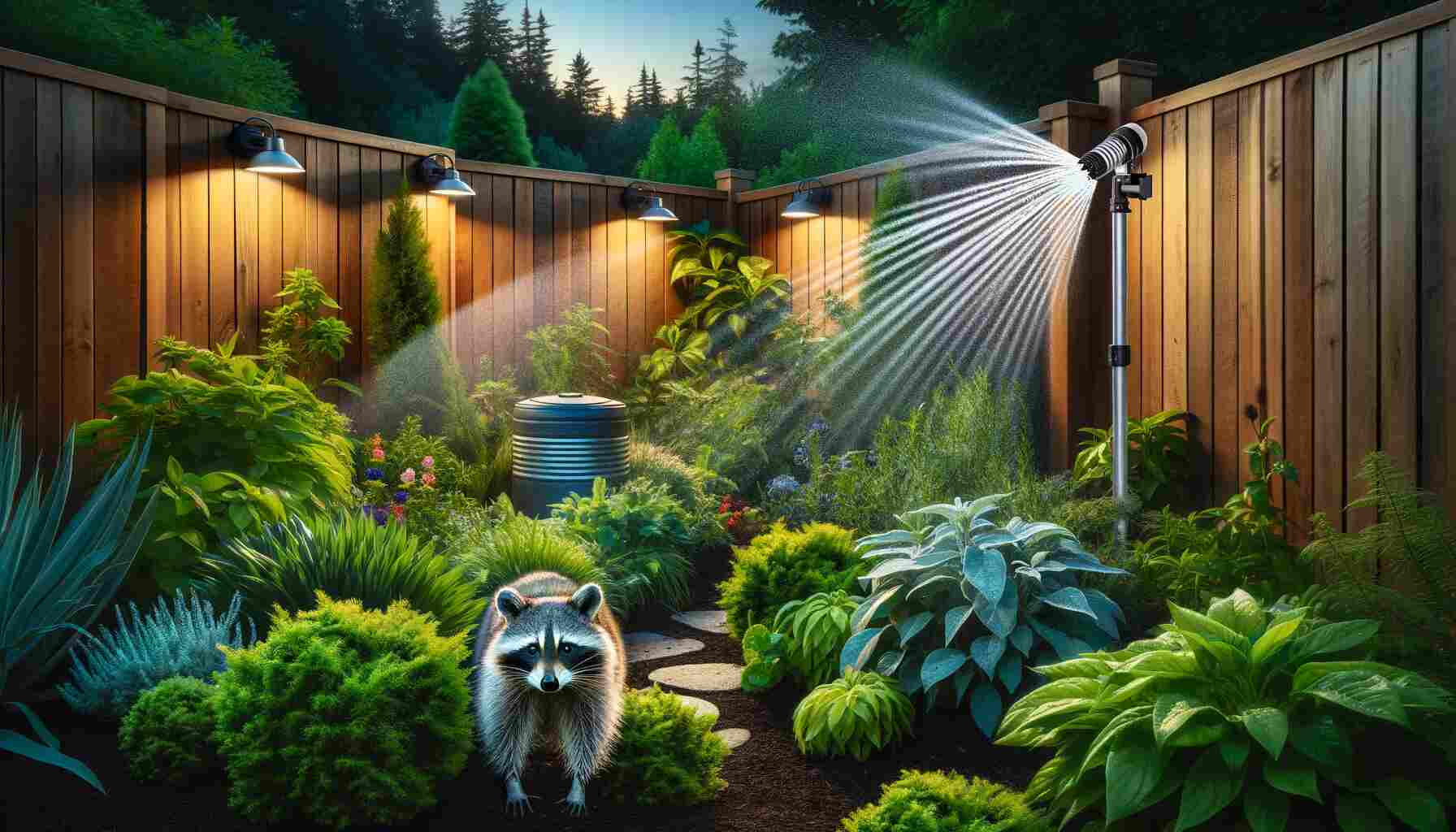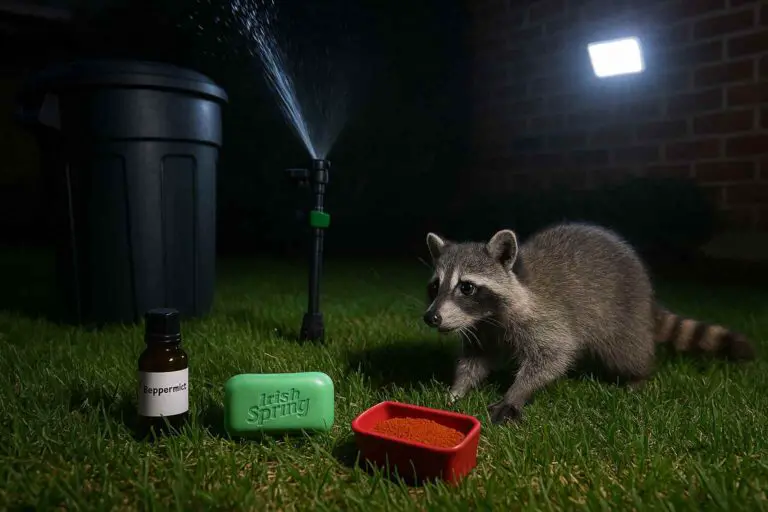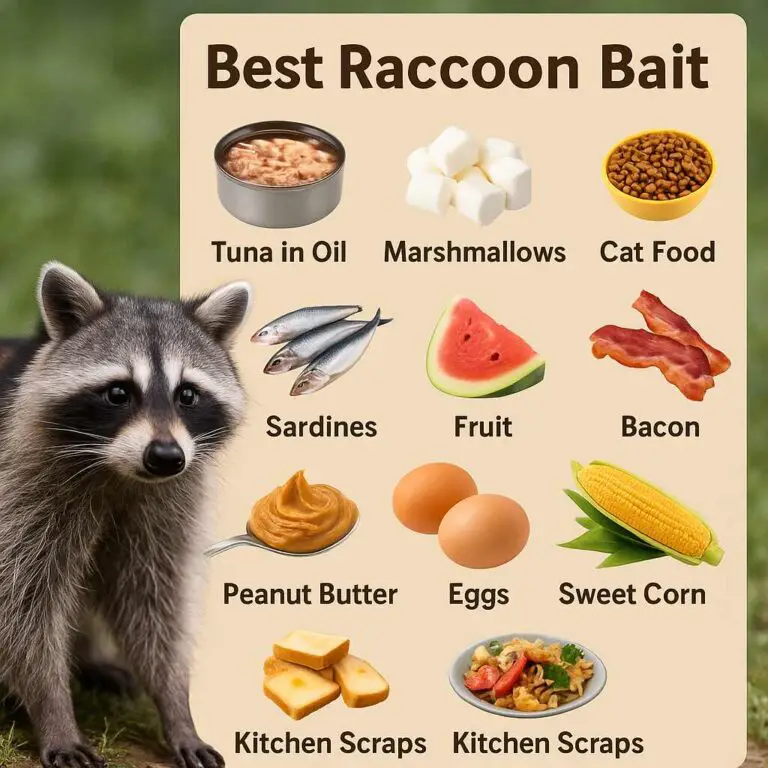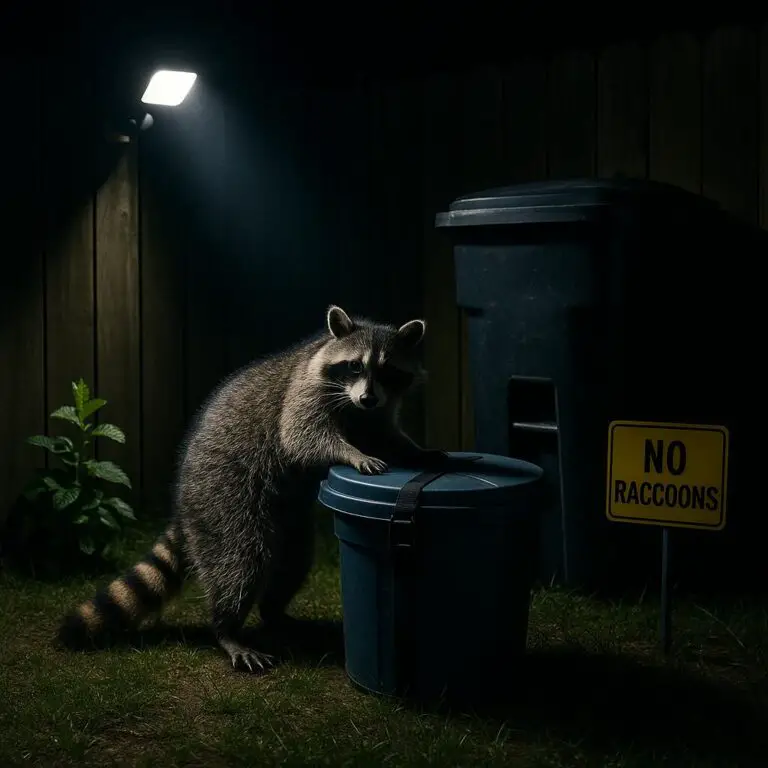This complete guide will provide you with practical, effective, and humane strategies to keep raccoons out of your garden, ensuring your plants and crops remain safe.
Raccoons are clever, resourceful creatures that can wreak havoc in your garden. Known for their dexterity and problem-solving skills, these nocturnal animals can be a significant nuisance for gardeners.
Understanding Raccoons: Behavior and Habits
What Attracts Raccoons to Gardens?
Raccoons are omnivores with a varied diet. They are attracted to gardens primarily for the following reasons:
- Food Sources: Raccoons are drawn to fruits, vegetables, nuts, and even insects found in gardens. They also raid garbage bins and compost piles.
- Water Sources: Gardens with water features, bird baths, or even water left out for pets can attract raccoons.
- Shelter: Overgrown areas, brush piles, and other secluded spots provide raccoons with places to hide and sleep during the day.
Identifying Raccoon Activity
Raccoons are nocturnal, meaning they are most active at night. Signs of raccoon activity include:
- Damaged Plants: Broken stems, trampled plants, and missing produce.
- Footprints: Raccoon tracks have five toes and resemble tiny human handprints.
- Droppings: Raccoon feces are cylindrical and can be found near feeding sites.
- Tipped Over Trash Cans: Raccoons are notorious for raiding garbage bins.
Effective Strategies to Keep Raccoons Out of Your Garden
1. Secure Garbage and Compost
Raccoons are opportunistic feeders. Securing garbage and compost is crucial in deterring them from your garden.
- Garbage Cans: Use raccoon-proof garbage cans with tight-fitting lids. Consider using bungee cords or weights to secure the lids.
- Recommended Product: Toter 64-Gallon Trash Can
- Compost Bins: Ensure compost bins are securely covered. Avoid composting meat, fish, or other animal products, which can attract raccoons.
- Recommended Product: FCMP Outdoor IM4000 Tumbling Composter
2. Remove Food Sources
Eliminating food sources reduces the attractiveness of your garden to raccoons.
- Harvest Regularly: Pick ripe fruits and vegetables promptly to prevent raccoons from feasting on them.
- Clean Up Fallen Produce: Regularly clean up any fallen fruits or vegetables.
- Feed Pets Indoors: Avoid leaving pet food outside overnight.
3. Use Fencing and Barriers
Physical barriers are one of the most effective ways to keep raccoons out of your garden.
- Fencing: Install a sturdy fence around your garden. A raccoon-proof fence should be at least 4 feet tall and have an outward-facing overhang at the top to prevent climbing. Bury the fence at least 6 inches underground to stop raccoons from digging underneath.
- Recommended Product: Amagabeli 4ft x 50ft Garden Fence
- Electric Fencing: Consider using an electric fence, which can provide an additional deterrent. Ensure it is installed according to local regulations and safety guidelines.
- Recommended Product: Zareba EAC10M-Z 10-Mile Electric Fence Charger
4. Employ Repellents
Several natural and commercial repellents can deter raccoons.
- Homemade Repellents: Mixtures containing hot pepper, garlic, or ammonia can be effective. Spray these around the garden perimeter.
- Commercial Repellents: There are various commercial raccoon repellents available, including granules and sprays. Follow the manufacturer’s instructions for application.
- Recommended Product: Critter Ridder Animal Repellent
- Predator Urine: Products containing predator urine (e.g., coyote or fox) can scare raccoons away.
5. Use Motion-Activated Devices
Motion-activated devices can startle raccoons and keep them at bay.
- Sprinklers: Motion-activated sprinklers spray water when they detect movement, startling raccoons and deterring them from entering the area.
- Recommended Product: Orbit 62100 Yard Enforcer Motion-Activated Sprinkler
- Lights and Sounds: Motion-activated lights or noise-making devices can also be effective in scaring raccoons away.
6. Modify the Garden Environment
Altering the garden environment can make it less inviting to raccoons.
- Trim Vegetation: Remove overgrown vegetation, brush piles, and other potential hiding spots.
- Secure Structures: Ensure sheds, greenhouses, and other structures are securely closed.
- Eliminate Water Sources: Remove or cover water features, and fix leaky faucets.
Humane Trapping and Relocation
If raccoons persist despite your efforts, humane trapping and relocation might be necessary. Here’s how to do it responsibly:
- Check Local Regulations: Before trapping, check local wildlife regulations to ensure it is legal and understand the requirements for relocation.
- Use Humane Traps: Use live traps specifically designed for raccoons. Place the trap near the area of activity and bait it with food raccoons find irresistible, such as marshmallows or canned tuna.
- Relocate Responsibly: Relocate the trapped raccoon at least 10 miles away from your garden to a suitable habitat. Ensure the new location provides adequate food, water, and shelter.
- Prevent Re-entry: After relocation, implement the aforementioned preventive measures to stop other raccoons from moving in.
Special Considerations
Protecting Specific Plants
Certain plants are more vulnerable to raccoon damage. Here are additional measures for specific plant types:
- Corn: Erect an electric fence around your cornfield or use a tall, sturdy fence with an overhang.
- Fruit Trees: Wrap the trunks with metal collars to prevent raccoons from climbing. Netting can also protect fruits from being stolen.
- Vegetable Gardens: Use row covers or netting to protect vulnerable plants.
Dealing with Baby Raccoons
If you encounter baby raccoons, it’s essential to handle the situation humanely:
- Do Not Disturb: If you find baby raccoons without their mother, observe from a distance. The mother may be nearby and will return once it’s safe.
- Contact Professionals: If the mother does not return, contact a local wildlife rehabilitator for assistance.
Preventing Future Problems
Consistency is key in keeping raccoons out of your garden. Regular maintenance and vigilance will help prevent future issues.
- Routine Inspections: Regularly inspect your garden for signs of raccoon activity and take prompt action if you notice any.
- Seasonal Adjustments: Adjust your preventive measures seasonally, as raccoon behavior and food sources can change throughout the year.
- Community Efforts: Work with your neighbors to implement raccoon deterrent strategies. A community-wide effort can be more effective than individual actions.
Statistics and Studies
Raccoon Populations and Behavior
- Population Growth: Studies show that raccoon populations in urban and suburban areas have increased significantly over the past few decades due to the abundance of food and shelter.
- Behavioral Adaptation: Research published in the Journal of Wildlife Management indicates that raccoons are highly adaptable and can quickly learn to exploit new food sources, making them persistent garden pests.
Effectiveness of Deterrents
- Fencing: According to a study by the University of California Agriculture and Natural Resources, installing a 4-foot fence with an outward-facing overhang reduced raccoon garden raids by 85%.
- Motion-Activated Sprinklers: A study conducted by the University of Nebraska-Lincoln found that motion-activated sprinklers were effective in deterring raccoons in 90% of test gardens.
Helpful Resources and Links
- University of California Agriculture and Natural Resources: Managing Raccoons
- Wildlife Rehabilitation Information: National Wildlife Rehabilitators Association
- Humane Society: Raccoon Facts
Final Thoughts
Keeping raccoons out of your garden requires a combination of strategies tailored to your specific situation. However, you can protect your garden from these clever critters by securing food sources, using barriers, employing repellents, and modifying the environment.
Always aim for humane solutions and, when necessary, seek professional assistance to handle persistent problems. With persistence and the right approach, you can enjoy a raccoon-free garden and a bountiful harvest.
By implementing these comprehensive strategies, you’ll not only keep raccoons at bay but also cultivate a safer, more enjoyable gardening experience.








